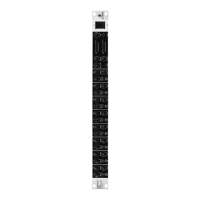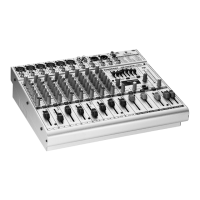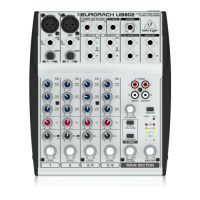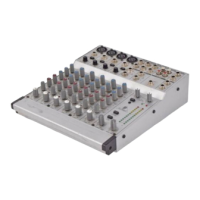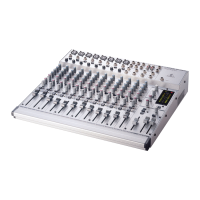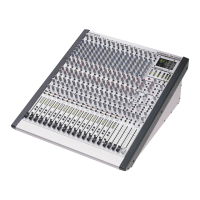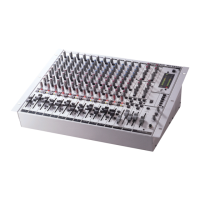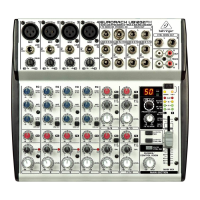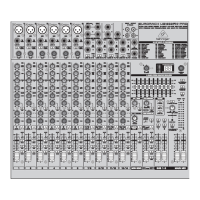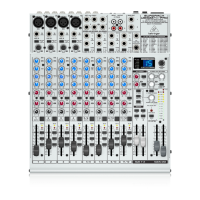11 Quick Start Guide
(13) The CD/TAPE INs are used to bring an external
signal source (e.g. CD player, tape deck,
etc.) into the console. They can also be
used as a standard stereo line input, so the
output of a second EURORACK or BEHRINGER
ULTRALINK PRO MX882 can be connected.
Alternatively, the line or tape output of a hi-
amplier with source selection switch could
also be hooked up here, allowing you to easily
listen to additional sources (e.g. cassette
recorder, minidiskplayer, sound card etc.).
(14) CD/TAPE OUT — These connections are laid
out as RCA connectors and are wired parallel
to MAIN OUT. Connect the inputs of a computer
sound card or a recorder here. The output
signal level is set up using the highly accurate
MAIN MIX fader.
(15) AUX SENDS — The FX connector routes the
signal, which you have extracted from the
individual channels by using the FX controller;
the MON plug does the same to the signal
that has been extracted by using the MON
controller. Connect the input of an external
eects processor to the FX plug, with which
you want to modify the signal sum of the
FX bus. Then, route the eects signal back to
the mixer over the AUX RETURN connectors.
With the MON outputs, you can connect
an amplier/headphones amplier for the
musicians to monitor.
(16) AUX RETURN — You can connect the
outputs of an external eects device to
the AUX RETURN connectors. In this case,
the eects signal is routed directly to the
main mix bus and is then mixed with the “dry”
signal. It is also possible to route the eects
signal as mono by using the L connector.
(17) Use the MAIN MIX fader to adjust the volume
of the main out.
(18) PHONES — The connector is used
to connect a pair of headphones.
The volume level is changed with the
PHONES/CONTROL ROOM controller.
(19) Use the PHONES/CONTROL ROOM control
to adjust the signal level of the CTRL OUT and
PHONES outputs.
(20) FX SOLO — If you want to only listen to
the eects signal with your headphones or
monitor speakers, then press the FX SOLO
switch. The signal of the eects device can
then be heard individually; the main mix or
CD/tape signal is inaudible at the PHONES
and CTRL OUT outputs.
(21) CD/TAPE TO CTRL — Press the CD/TAPE
TO CTRL switch if you want to monitor the
CD/TAPE IN via the CTRL OUT and PHONES
outputs. A typical studio application of
this function is recording music into a
digital audio workstation (DAW) with
simultaneous reproduction.
(22) When the CD/TAPE TO MIX switch is pressed,
the CD/tape input is assigned to the main
mix providing an additional input for tape
machines, MIDI instruments or other signal
sources that do not require any processing.
(23) 100 FIRST-CLASS EFFECTS — The EURORACK
RX1202FX features a built-in digital stereo
eects processor. This eects processor oers
a large number of standard eects such
as Hall, Chorus, Flanger, Delay and various
combination eects. Using the FX control,
you can feed signals into the eects processor.
The integrated eects module has the
advantage of requiring no wiring. This way,
the danger of creating ground loops or uneven
signal levels is eliminated at the outset,
completely simplifying the handling.
(24) The SIG LED on the eects module shows
the presence of a signal whose level is high
enough. This LED should always be on.
However, make sure that the CLIP LED lights up
only sporadically. If it is lit constantly, you are
overdriving the eects processor, which leads
to unpleasant distortion. If this occurs, turn the
FX controls down somewhat.
(25) The PROGRAM control has two functions:
by turning the PROGRAM control, you dial
the number of an eect. The number of the
preset you just dialed up blinks in the display.
To conrm your selection, press the PROGRAM
control; the blinking stops.
(26) By using the FX TO MAIN controller, the eects
signal is sent to the main mix. No eects
signal is to be heard in the summed signal of
the mixer when the controller is positioned
entirely to the left. Choose this position if you
want to use an external eects device for the
FX output.
(27) FUSE HOLDER/IEC MAINS RECEPTACLE —
The mains connection is made via a cable with
an IEC mains connector and meets the required
safety standards. An appropriate mains cable
is supplied with the equipment. Blown fuses
must only be replaced by fuses of the same
type and rating.
(28) Use the POWER
switch to turn on the mixing
console. The POWER switch should always be
in the “O” position when you are about to
connect your unit to the mains.
(29) The PHANTOM switch activates the phantom
power (necessary to operate condenser
microphones) on the XLR sockets of the mono
channels. The red +48 V LED illuminates
when phantom power is on. As a rule,
dynamic microphones can still be used with
phantom power, provided that they are wired
in a balanced conguration. In case of doubt,
contact the microphone manufacturer!
Check Out behringer.com for Full Manual

